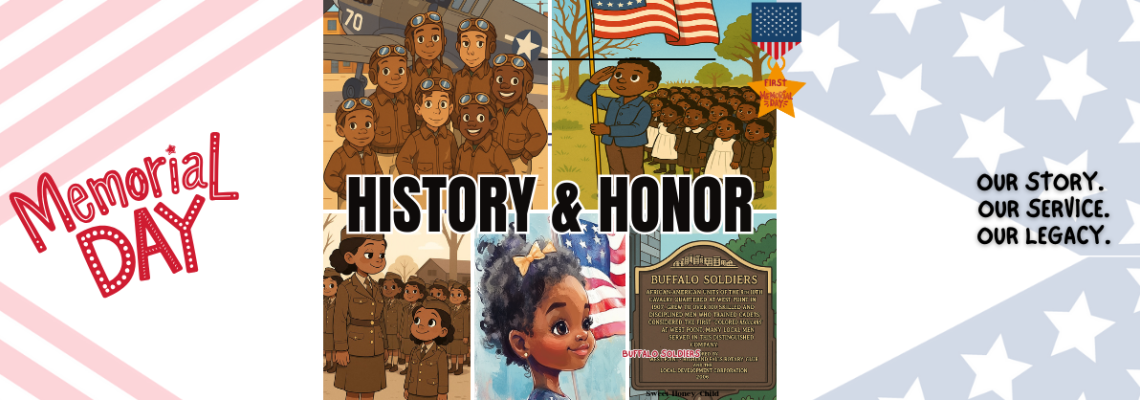The True Story of Memorial Day

Memorial Day: History & Honor
Introduction
Memorial Day is often seen as the start of summer. It is a time for family barbecues, sunshine, and much-needed rest. But the heart of this holiday runs much deeper, especially for Black families. Memorial Day is not just about honoring fallen soldiers; it is about reclaiming a history of leadership, love, and community that Black Americans built from the very beginning.
It is time we tell the full story. The story of how Memorial Day was born in the hands of newly freed Black Americans who turned grief into purpose. The story of Black women and children who knew how to lead with care. And the story of the Six Triple Eight, the all-Black, all-women battalion who carried that same spirit of service across the ocean during World War II.
A Memorial Rooted in Black Freedom: Charleston, 1865
Picture this: It is May 1, 1865, just weeks after the end of the Civil War. In Charleston, South Carolina, more than 10,000 Black men, women, and children gather at a former racetrack that had been turned into a Confederate prison camp. Hundreds of Union soldiers who had died in captivity are buried there in unmarked graves.
The Black community in Charleston knew these soldiers deserved better. They exhumed the bodies, reburied them with dignity in individual graves, and built a fence around the new cemetery. At the entrance, they placed an arch that read: “Martyrs of the Race Course.”
Leading the procession were 3,000 Black schoolchildren. They carried flowers, sang freedom songs like “John Brown’s Body,” and marched in honor of the soldiers who had given their lives for freedom. Black women organized every detail of the day, from the logistics to the music, to the care and beauty of the space.
This was the very first Memorial Day. It was not just a funeral. It was a statement. A declaration that Black Americans would lead in defining what freedom meant and how it should be remembered.
Why This Story Matters for Our Daughters
When we share the true story of Memorial Day with our daughters, we give them a deeper sense of belonging. They need to know they come from people who have always led with courage and care. They come from organizers, builders, and storytellers who did not wait for permission to honor what mattered.
- Black children have always been capable of leading.
- Black women have always been the ones to create and sustain meaningful traditions.
- Our ancestors knew that remembrance is an act of love and resistance.
- Honoring the past helps us build a stronger future.
This is a story of resilience, and it is a legacy worth celebrating.
The Six Triple Eight: Black Women Who Delivered Hope
Decades after Charleston, Black women were still making history through service. During World War II, the 6888th Central Postal Directory Battalion, known as the Six Triple Eight, became the only all-Black, all-women battalion sent overseas. Led by Major Charity Adams, these 855 women were tasked with an enormous challenge: sorting and delivering millions of backlogged letters and packages to American soldiers across Europe.
They faced racism, sexism, and dangerous conditions, working in unheated warehouses with little support. But they knew the importance of their mission. Their motto was clear: “No mail, no morale.” Within six months, they processed over 17 million pieces of mail. They reunited soldiers with news from home, wedding announcements, photos of newborns, and messages of love that kept them going.
The Six Triple Eight did not just move mail. They moved hearts. They built systems the military had never seen before. They proved that Black women could lead, innovate, and deliver under pressure.
Their story reminds us that service takes many forms, and that Black women have always been at the heart of community care.
Final Reflection: We Remember, We Lead
Memorial Day is a reminder that Black Americans have always been at the heart of remembrance, resilience, and leadership. We did not just survive history. We shaped it. We did not just grieve. We built rituals of healing and community. And we continue to show up, lead with love, and honor what matters.
This year, as you gather with family or friends, take a moment to tell this story. Share it at your table. Pass it down to your children. And remind them that they carry the legacy of the children in Charleston and the women of the Six Triple Eight in their hearts.
Black history is American history. Our story is not a side note. It is the foundation. Every time we remember, we build a stronger future for the next generation.
Leave a Comment